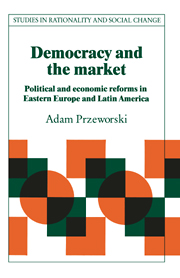3 - Capitalism and socialism
Published online by Cambridge University Press: 05 June 2012
Summary
Introduction
“We could feed everyone,” my daughter remarked confidently at the dinner table. Could we?
What she meant is that “we,” humankind, have the technological and organizational capacity to produce in the immediate future enough to satisfy the basic needs of everyone on earth. Yet we do not. Instead, we pay cultivators not to plant, winegrowers to refine their harvest into poisonous liquids, sheep breeders not to raise female lambs. We take what farmers do produce and build mountains of butter the size of ski runs. And we do all this while millions starve.
The absurdity is apparent. Yet we have learned to live with it. Indeed, we distribute prizes to people who refer to this world as rational under constraints that are not of our making. And under such constraints, it is; if there is nothing better that can be done, doing as well as we can is rational. But are these constraints not of our making?
The question goes all the way back to the industrial revolution (Elster 1975). But my generation is the last that can reasonably place faith, and commitment, in the particular blueprint that congealed in Europe between 1848 and 1891: “rational administration of things to satisfy human needs,” socialism. Today, as market-oriented reforms sweep the countries that have experienced “socialism on earth,” this vision is no longer credible.
A good economic system would produce as much as possible of what people want in ways that minimize the use of natural resources and labor while providing a minimum of material welfare for everyone.
- Type
- Chapter
- Information
- Democracy and the MarketPolitical and Economic Reforms in Eastern Europe and Latin America, pp. 100 - 135Publisher: Cambridge University PressPrint publication year: 1991

